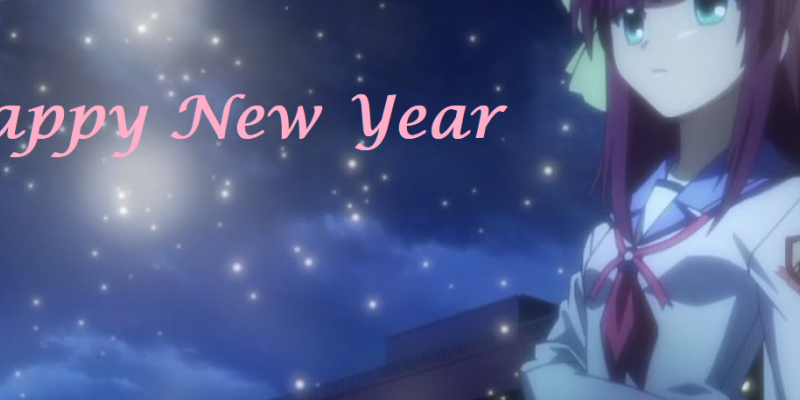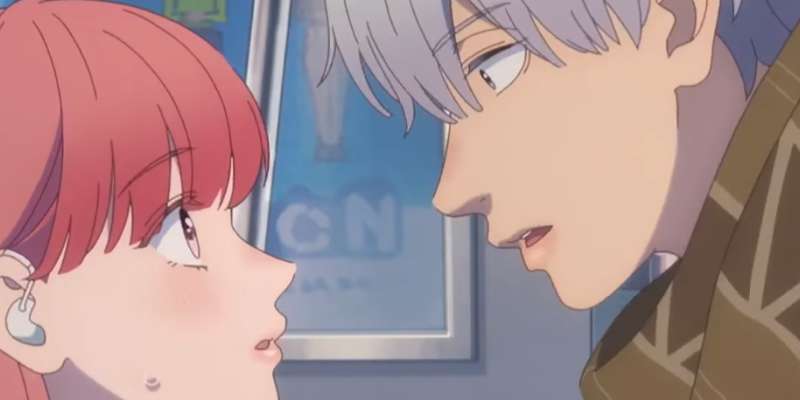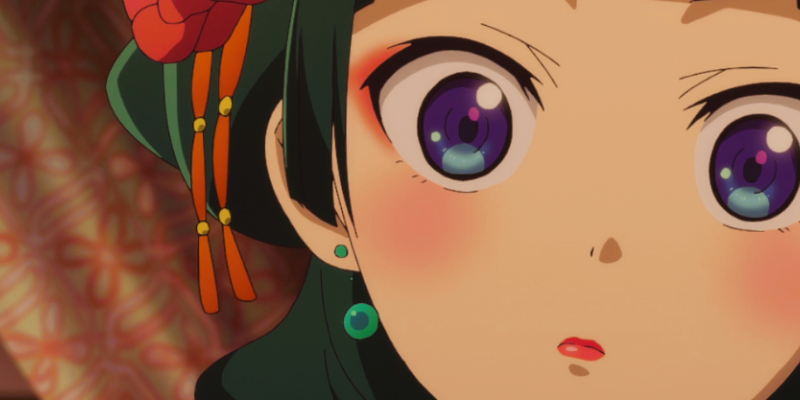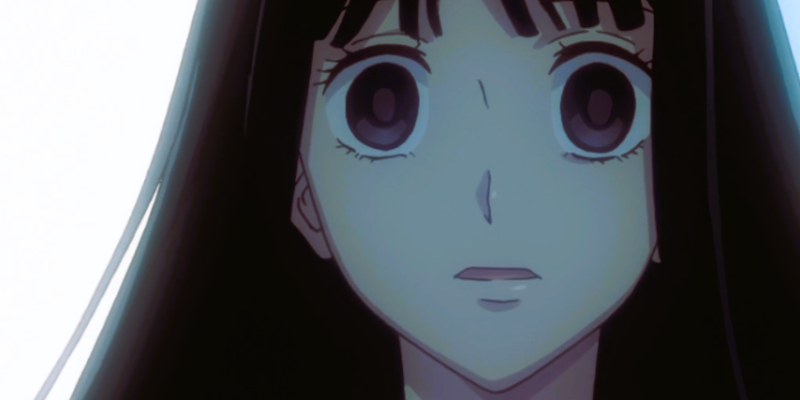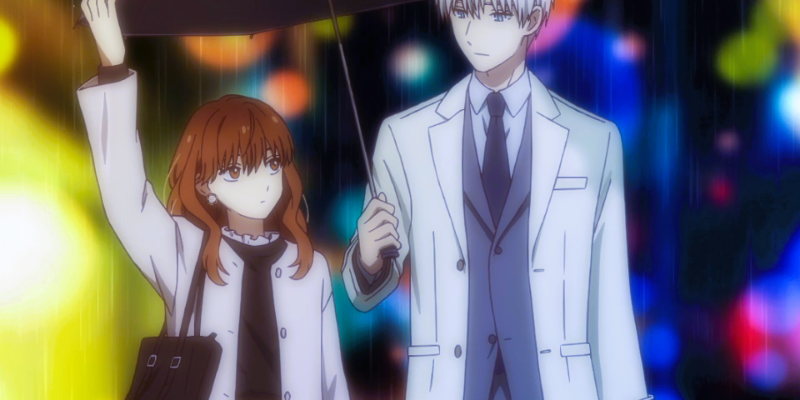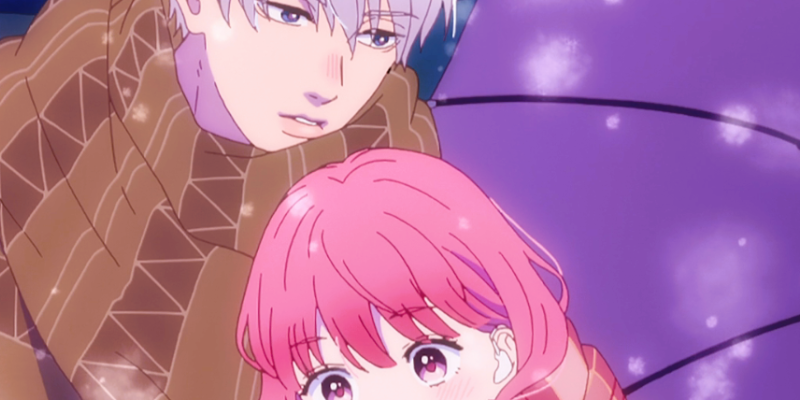Mononogatari: Malevolent Spirits is a 2023 anime focusing on clans of Saenome (exorcists) who mitigate threats posed by wandering spirits. It’s similar to Twin Star Exorcists in terms of the style of exorcism. The type of spirits that we deal with in this series are Marebito, spirits from other realms who possess objects in the human world. Once they have latched on to their identity as that object, the Marebito becomes a Tsukumogami, a powerful spirit who can assume a humanoid form and use supernatural abilities.
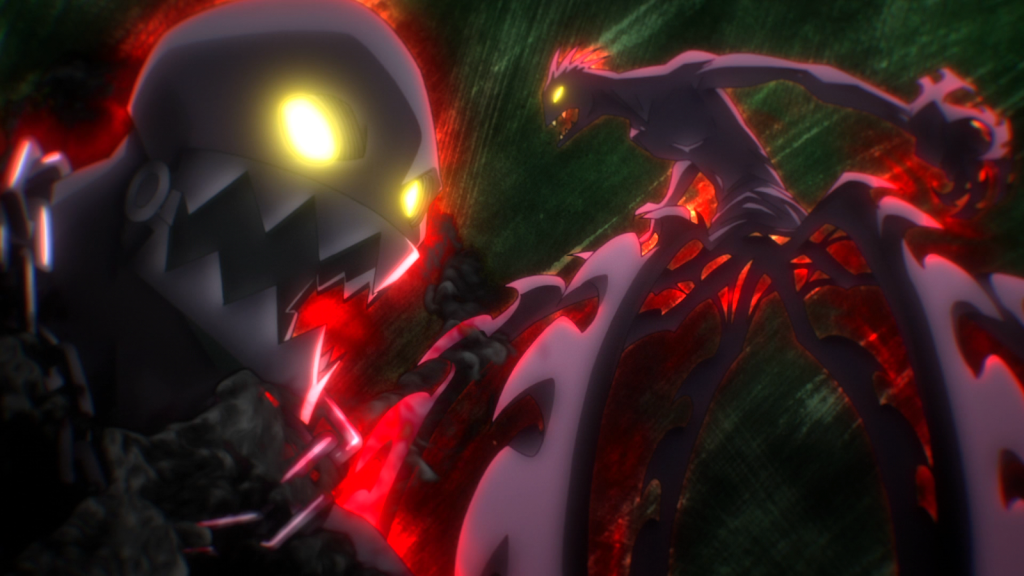
So far, there have been two 12-episode seasons of Mononogatari. Since I never got around to writing a review for the first season back in winter, I decided to tackle both seasons at once for this article. This review will examine five categories that are useful in judging an anime. Just to restate, it covers both seasons of Mononogatari: Malevolent Spirits. Before we jump right in, please be aware that there may be spoilers in this post.
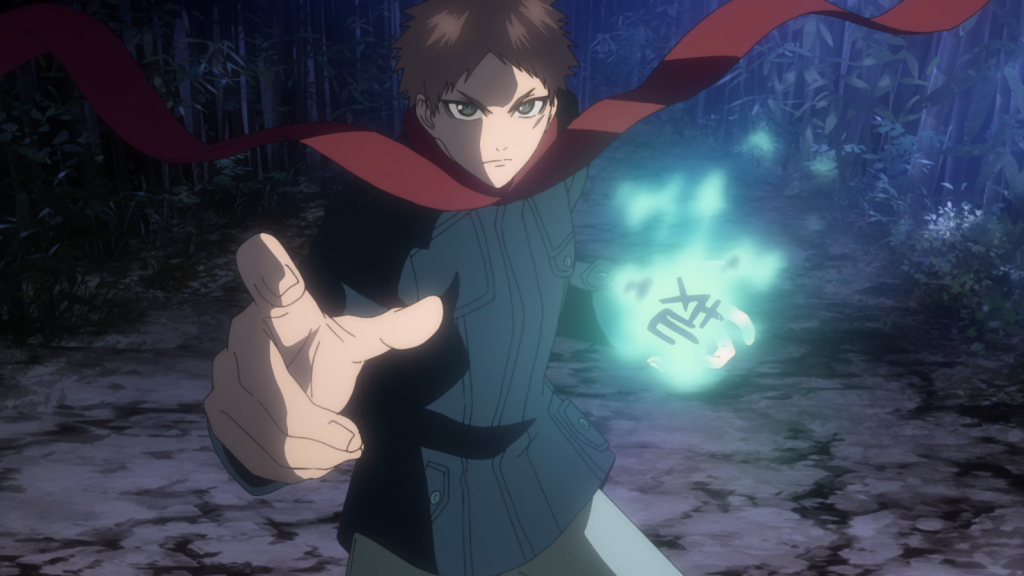
Visuals: 6/10
.The visual style of Mononogatari is pretty standard. It’s lacking in detail and creativity compared to higher-budget anime. Personally, I liked most of the character designs, especially for the female characters. But it’s true that some are easily forgettable, and that the style is very simplistic. The face expressions were good, if slightly over-the-top at times. I also enjoyed the colors, lighting, and the way the Tsukumogami have a different types of eyes compared to humans.
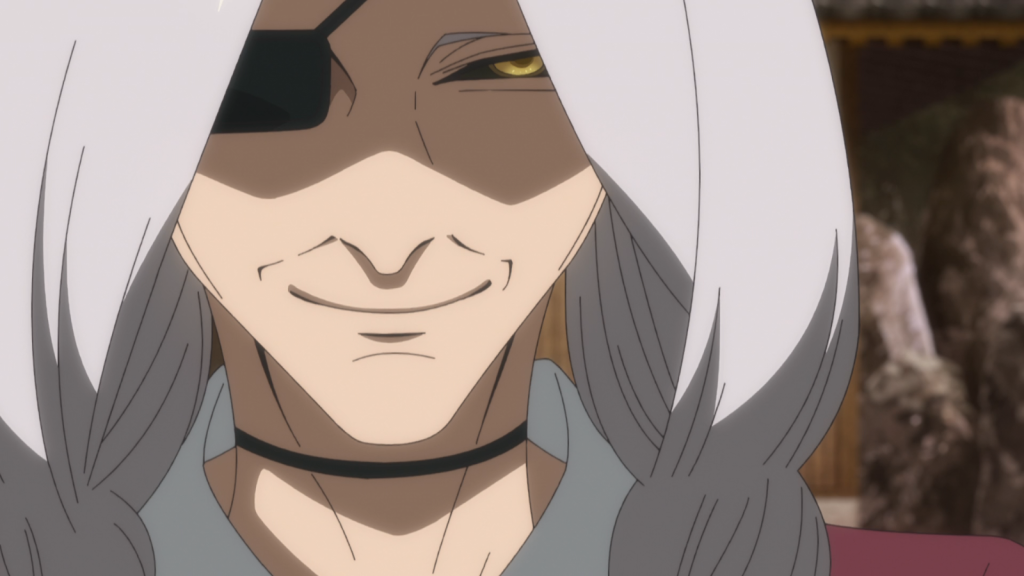
I would probably give the visual category a slightly higher rating if it wasn’t an anime with a lot of important action sequences. These fight scenes are not horrible, but compared to what I’m used to seeing in fantasy and shounen anime, they looked distinctly low-quality. There is minimal movement and low framerate. Also, the choreography of the fights was a bit boring. For these reasons, the visuals in Mononogatari are only “fine/average” rather than “good.”
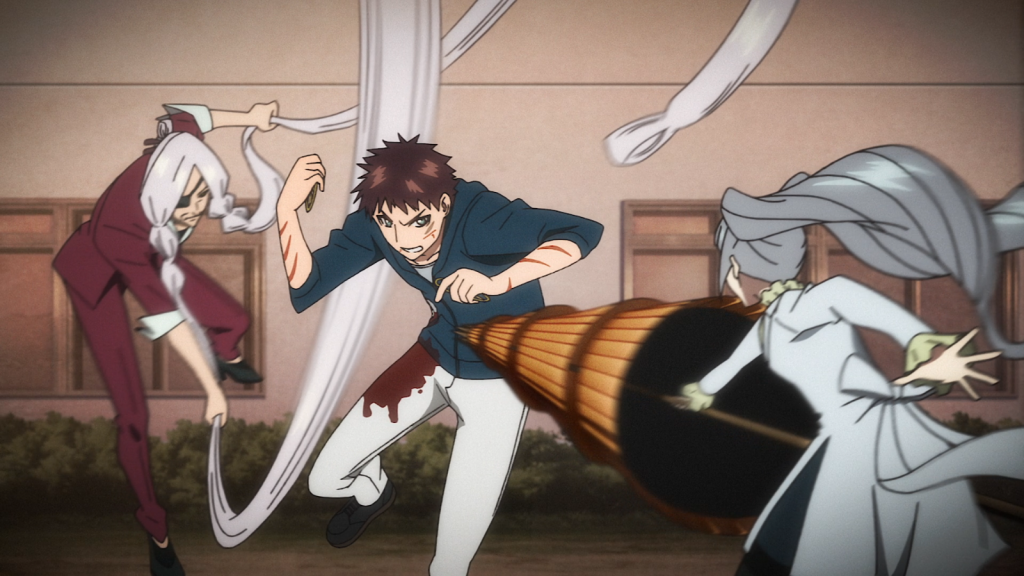
Story: 7/10
A young man named Hyoma is supposed to be the next head of the Kunato Saenome (exorcist) clan. Compared to his two older siblings, he isn’t especially talented. But since those two died in the line of duty, it falls upon Hyoma to inherit the clan. A savage, mysterious Tsukumogami killed Hyoma’s siblings. As a result, he was traumatized. He now hates all Tsukumogami spirits and delights in destroying them.
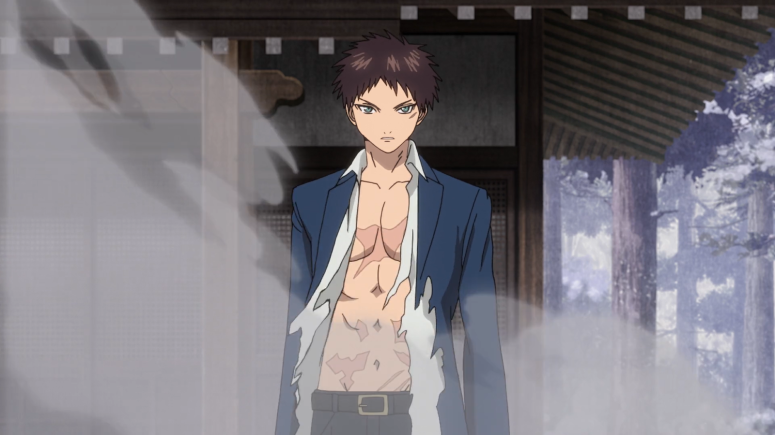
Hyoma’s grandfather knows the young man’s hate isn’t healthy, so he sends him on a special mission. From now on, Hyoma will live with Botan Nagatsuki, a girl with dangerous dormant powers. She is guarded and protected by a family of six Tsukumogami spirits. Hyoma’s job is to protect Botan and get along with her family instead of hating them. As time passes, the series reveals that Botan is the target of a conspiracy trying to awaken the God of the Marebito that lives within her.
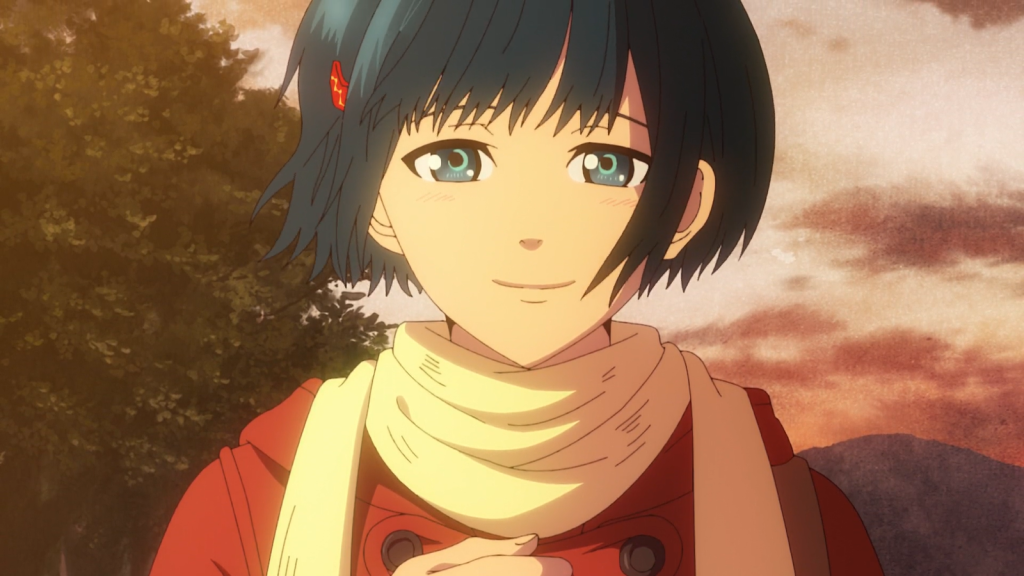
This is a decent premise. It’s slightly different from a shounen because it’s more about the personal growth of Hyoma and Botan than it is about fighting or getting stronger. Aside from the concept, most other aspects of the story category were okay, too.
The world-building was rather vague, but I liked learning about the Saeonome exorcist clans in Japan. The different types of Tsukumogami and their powers were interesting as well. Nagi, for example, is a spirit inhabiting a katana. As such, his humanoid form can produce or become a blade at any time. That’s pretty cool.
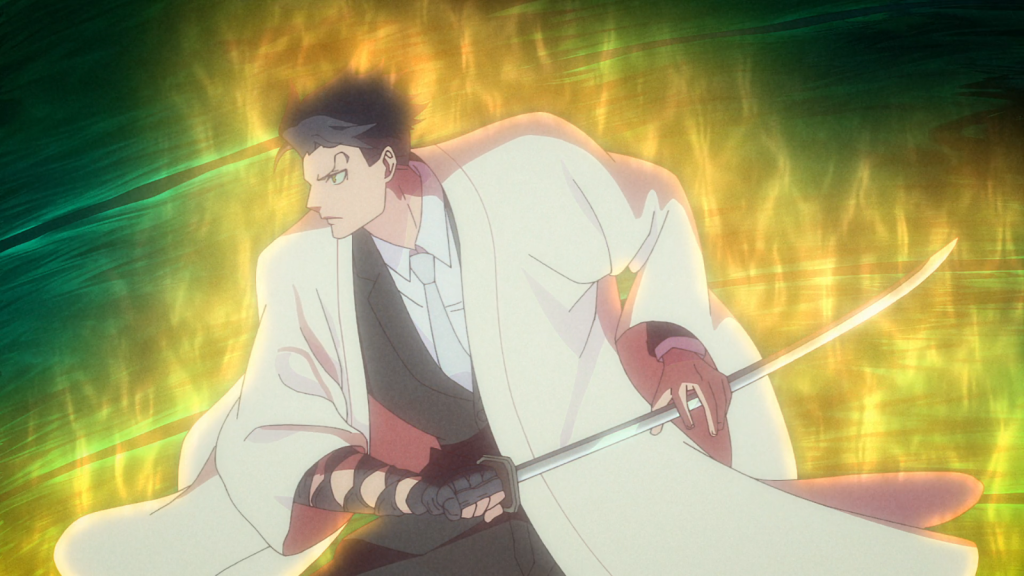
There are a couple of episodes where nothing much happens, but for the most part, the pacing is good. There’s plenty of action, some comedy, and some sweet moments. The content balance is fine. Though the story is good, overall, the writing and order of events is a little “off,” or slightly slow or awkward. The story themes are not very strong. If you try, you can see themes and morals related to trauma, trust, and open-mindedness, but these concepts are not expressed powerfully enough.
Overall, the story of Mononogatari: is decent, but lacking in the way it does narrative. It’s just a bit stale, somehow. Still, I think it deserves better than 6 due to the good starting concept, well-balanced content and pacing, and interesting fantasy elements.
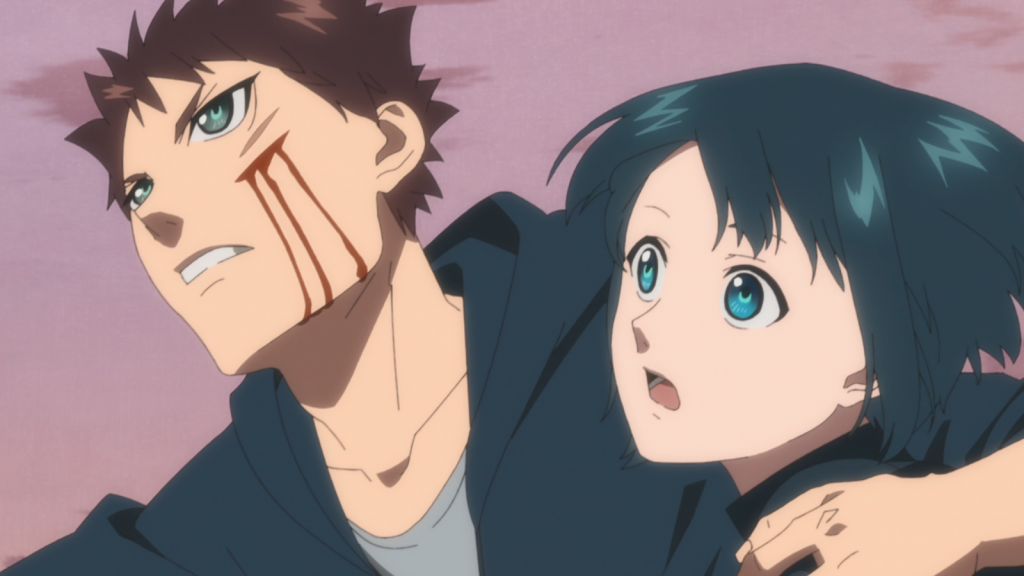
Audio: 8
The voice acting was good, although I’m not familiar with most of the cast except for Miyuki Sawashiro. This talented and experienced VA played Haori. Takeo Ohtsuka was the voice of Hyoma. He did great, especially considering that he hasn’t had many protagonist roles yet. (I’ve only heard him as Kakeru from Run with the Wind.)
Botan was voiced by Yuuki Takada, whose only other role that I know was Aoba from New Game. She also did fine, though the writing didn’t afford her many chances to work outside her usual soft, light talking style. Miss Takada also does casual cosplays for some of her roles, which is always fun.

The music and songs were also terrific. Especially in the second season, the instrumental music was often really cool. The music for both seasons was composed by John Kanda and XELIK. The first opening song was “Koigoromo” by Arcana Project. As for the second opening song, it was “Ta ga Tame” by Megatera Zero. The ending songs were “Rebind” by True (season 1) and “Private Room” by Azusa Tadokoro (season 2).
Both openings are upbeat rock songs that were enjoyable for me, but I preferred “Ta ga Tame” for the grungy male vocals. It was also just slightly more on the harder side of rock by comparison, which I appreciate. The ending song “Rebind” is absolutely beautiful. I love the vocal style and the way soft piano led up to an emotional chorus. “Private Room,” the second ending, wasn’t quite my style of song. Regardless of my different preferences, I think the audio for this anime was excellent.
Characters: 7
The characters in Mononogatari are often predictable and typical. That or they don’t have enough character development. However, much like the story category, I feel like the character category deserves better than a 6/10 when you consider the bigger picture. The character concepts are all pretty good. For instance, Kagami is a spirit that possessed a mirror and then gained humanoid form as a Tsukumogami. Her defensive powers involve mirrors. (I also think her personality is a bit like a reflection of Botan.)
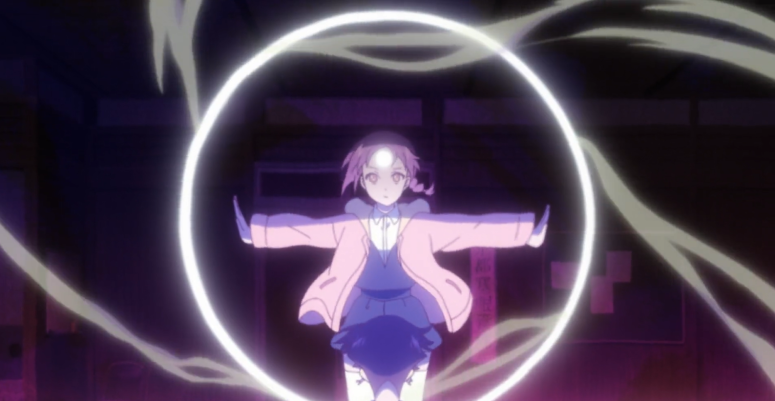
Besides good starting concepts, most of the main characters are likeable and not annoying, at least to me. Even Nagi, who could be fairly cringe-worthy, was also cool in his own way and very reliable in a pinch. The general character development was decent, but not detailed or creative enough. Hyoma and Botan got some good character development, but some of the other characters were underdeveloped, or their potential was essentially never touched.
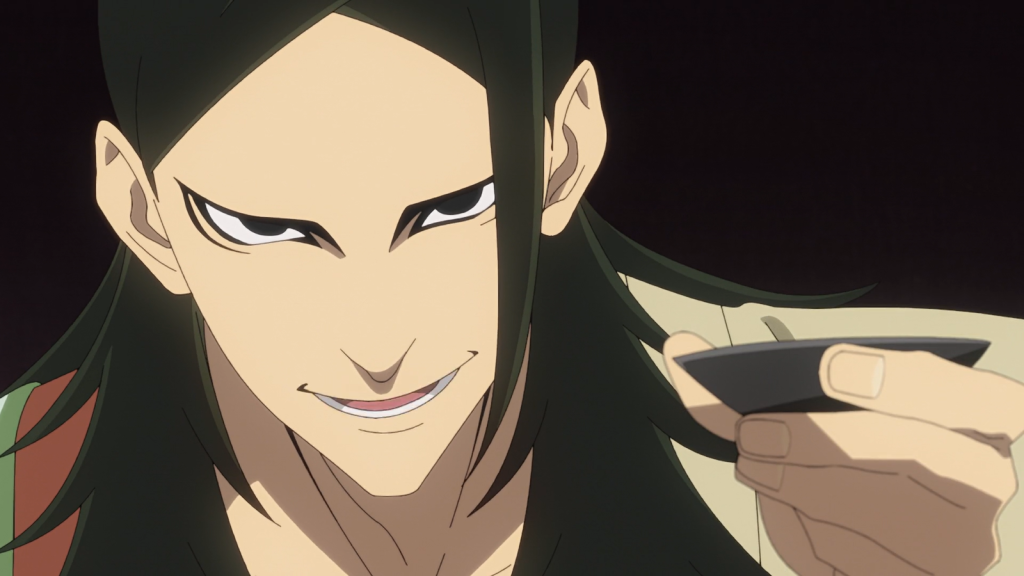
Mononogatari features several supporting female characters that struck me as strong, cool, and/or interesting. Tsubaki, Haori, and Yuu are the main ones. They all have cool fighting abilities and distinct personalities. Though the main female character, Botan, isn’t exactly “cool” or strong, she is great in other ways. She’s a hard-working, bright-minded student with so much kindness to give. Despite having good female characters, this anime did frustrate me a little with how it handled my favorite girl, Yuu.

Yuu is a Marebito that possessed an Oriental hairpin set. So, in her human form, she uses giant hairpins as weapons. Besides her more masculine personality, the other reason I liked her was that she has a crush on Botan. But since her duty is to stoically protect Botan and help guide her into a good marriage, she can never reveal these feelings. This sub-plot had so much potential, but it was abandoned after the one episode early on where Hyoma gets to know Yuu. That was disappointing.
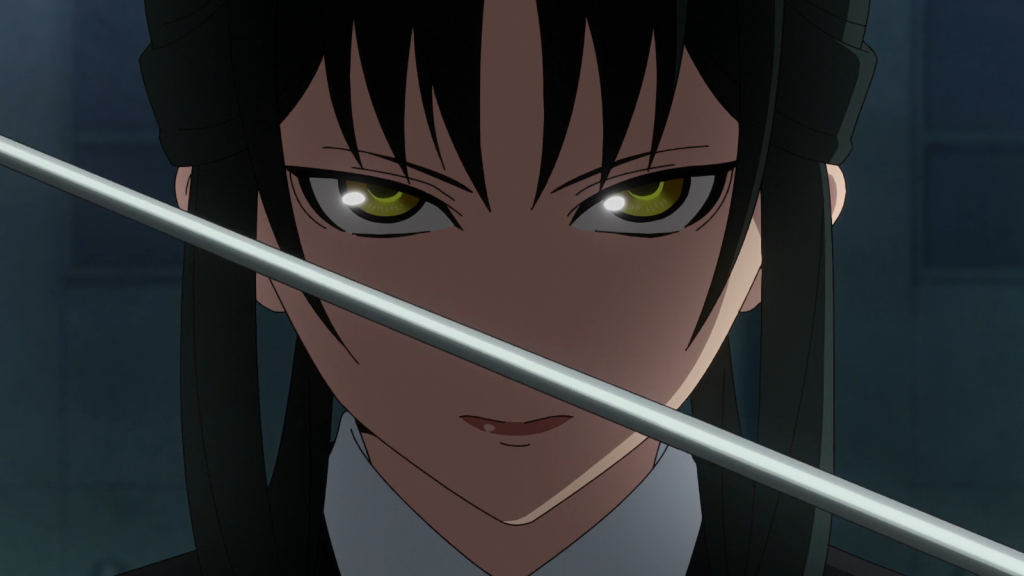
As for the male protagonist, Hyoma Kunato, I enjoyed this character a lot. He has funny habits, like his inability to express himself well and his over-the-top formality when he’s feeling nervous or awkward. Like Botan, Hyoma has to work through personal trauma. While Botan’s issue is about trusting others, Hyoma’s is about becoming less resentful. Hyoma is socially awkward, but he’s also strong, brave, and hard-working. All in all, the characters in this anime are pretty good.
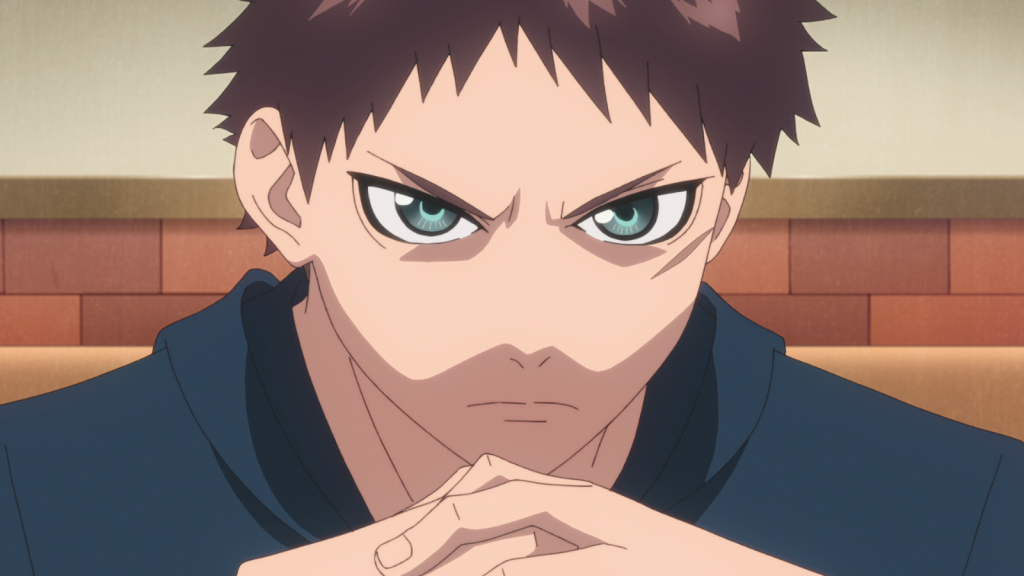
Enjoyment: 7/10
My enjoyment of Mononogatari would have been higher if the story was a bit more original and interesting. It was often too easy to predict. I occasionally got bored with this show compared to some others. There were also wasted opportunities for character development. Finally, the fight scenes didn’t look very good. These are the cons of the series, or things that subtracted from my enjoyment. Next we’ll look at the positives.
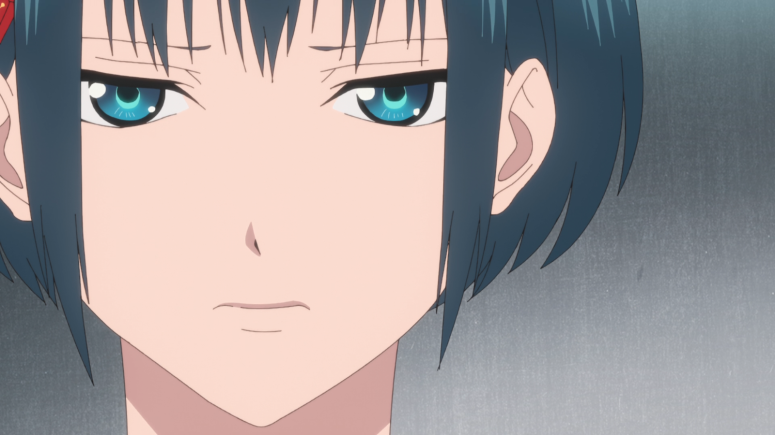
For the most part, despite the simplicity, I liked the character designs, colors, and visual style in general. Tsubaki had an especially likeable design in my eyes. Speaking of Tsubaki, I also enjoyed her personality and learning that she lusts after battle in an almost sexual way. It’s not just Tsubaki. There were many characters whose design I liked as well as appreciating their personalities.

As I mentioned earlier, I really liked Yuu, the hairpin girl with dark hair. Kagami’s design was cute and Haori’s was dignified but sexy. Many people said Hyoma looked too much like Eren Yeager, but I think the difference in his build, age, and personality make it clear that he isn’t some copycat-character. I liked his design, including the long, flowy scarf he wears. As for Botan, I love her weird style of dressing and her short, tomboyish haircut. She’s absolutely adorable, especially when she smiles or blushes.
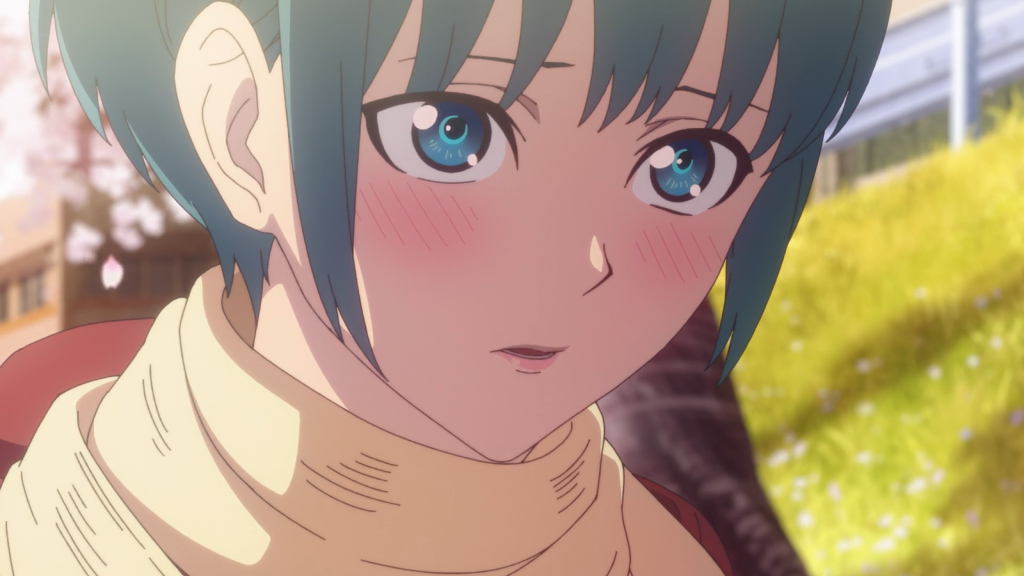
In season 2, there was even more to enjoy than before. I loved the Bureau of Traditional Music, which is made up of Tsumabiki with the stringed instrument, Tsuzumi with the drum, and Fukie with the flute. All were interesting characters, although Tsuzumi didn’t have much personality or many lines. In addition, late in season 2, we also met the Marebito “God” that lives inside Botan. That entity was really cool. I love androgynous, god-like antagonists.
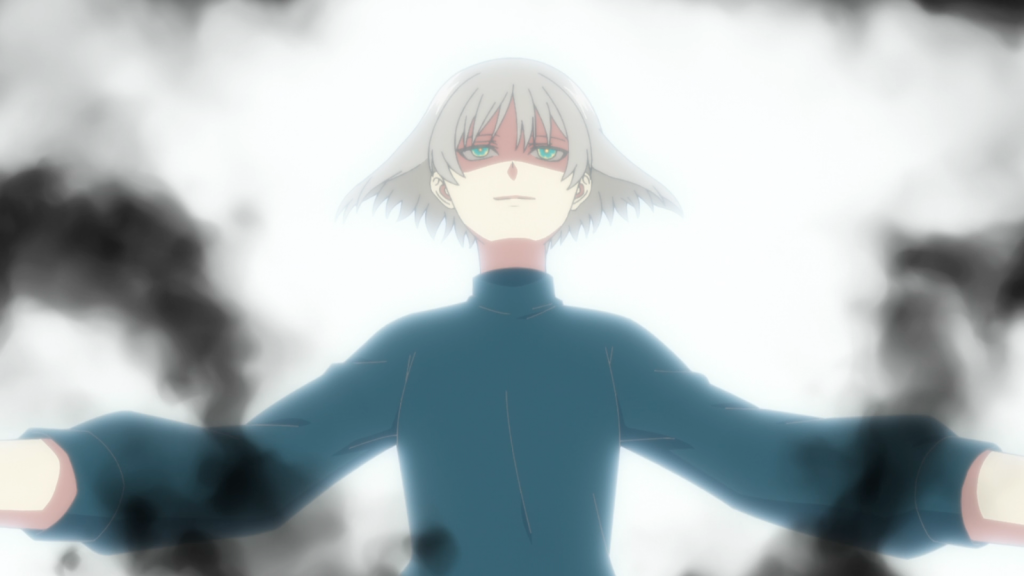
Other enjoyable elements of this anime include the music, songs, and interesting fantasy/mythology aspects. With regards to the last item, I feel like Mononogatari is a good show for anyone interested in fantasy utilizing animism. (Animism is the belief that things like plants and inanimate objects have spirits. A lot of Eastern mythology and religion focuses on this idea.) At the end of the day, despite some issues, Mononogatari: Malevolent Spirits was quite enjoyable.
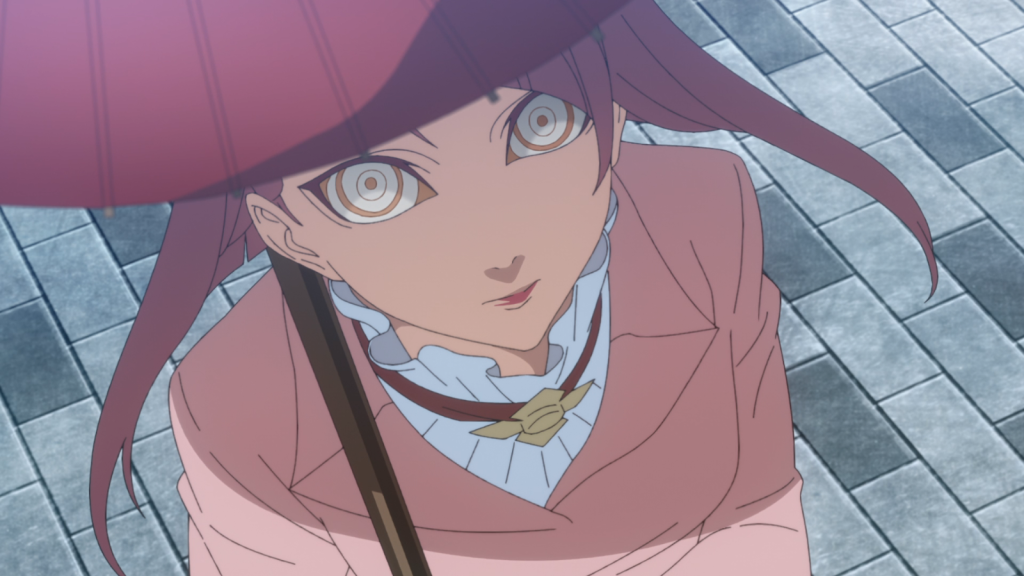
Overall Score: 7.0 / 10.0
While a score in the 6s is “fine/average,” a score in the 7s is “good/enjoyable” by my definition. It looks like Mononogatari made the cut. I think 7.0 is a fair score, but to my surprise, the first season currently sits at 7.26 on MyAnimeList.net. However, only about 21,000 people have voted on it. Once more people watch it over the next few years, I expect the score to go down. Personally, I hope it doesn’t decrease too much. Mononogatari may be lower budget and lacking in some ways, but I liked it overall.
Thanks for reading~
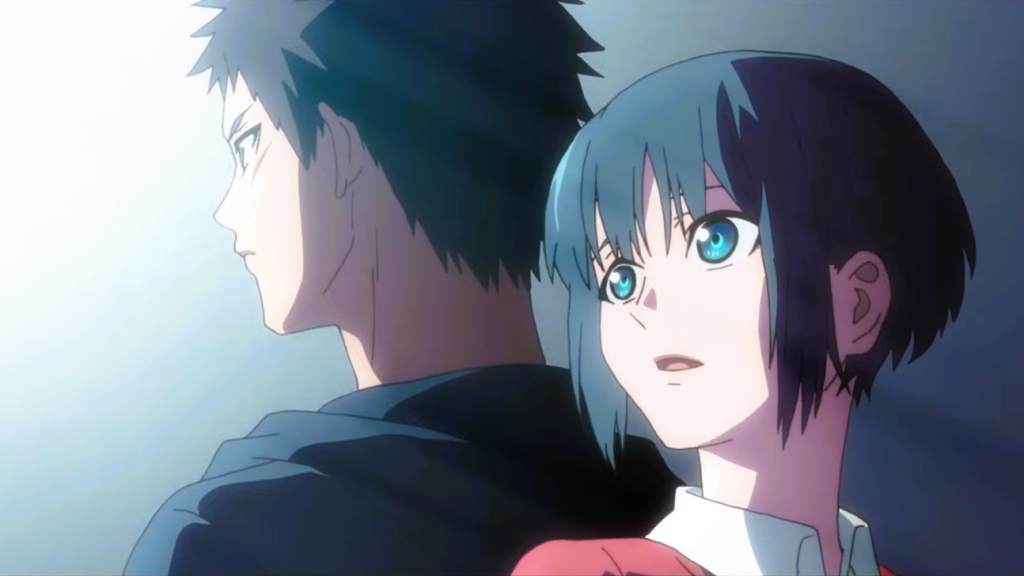
PATREON
